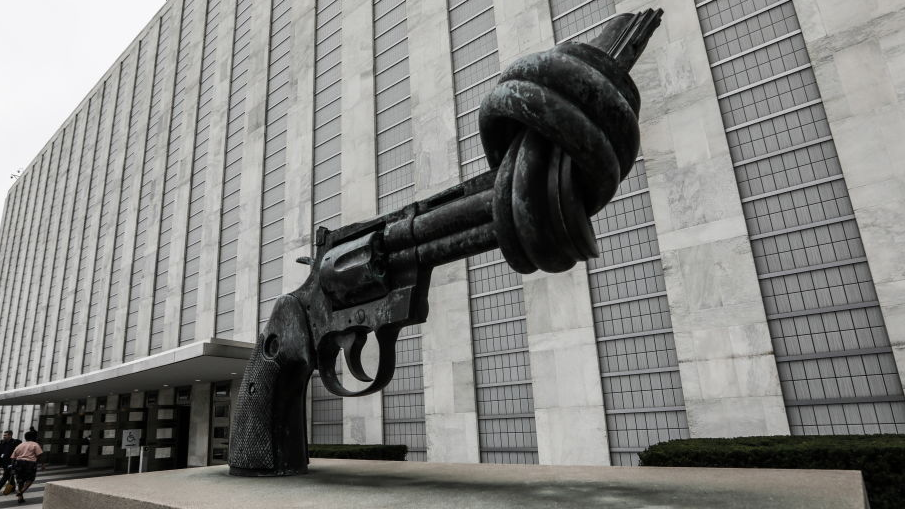
World map on transparent virtual folder in sequence. /Getty
World map on transparent virtual folder in sequence. /Getty
Editor's note: Bradley Blankenship is a Prague-based American journalist, political analyst and freelance reporter. The article reflects the author's opinions and not necessarily the views of CGTN.
As Washington ramps up its "strategic competition" against Beijing, one of the primary concerns from Washington policymakers – that China "wants" to create a new global order – deserves serious reflection. While you wouldn't know if you were following the policy discourse so far in the media or even in the halls of Congress, the jury is still out on whether this is actually true or not.
First, what exactly does "global order" mean? The U.S. frequently discusses a "rules-based system" that dictates how international relations are (or should be) conducted, but what does it actually mean?
The United Nations (UN) perhaps serves as the logical starting point. During World War II, the Allied powers sought to create a postwar international organization to replace the then-existing League of Nations that had so far failed to uphold international security. In 1945, the UN Charter was signed with 50 of the 51 initial members.
As the one of the world's largest international organizations, the UN now includes 193 sovereign states and its charter serves as the fundamental starting point of international law. The UN Charter itself mandates that all member states secure international peace, uphold international law, as well as solve problems in their own countries related to social equality and achieve "higher standards of living" for their citizens.
Washington's policies before, during and after the foundation of the UN both at home and abroad indicate that clearly this is not the global order policymakers today are talking about.
The United States is by far the most belligerent country in the world. This is a country that has been at war for about 227 of its 245 years of existence and has interfered in about one in nine ballot exercises around the world between 1946 and 2000.
And not only does the country itself engage in these renegade acts, it has systemic drivers in place that make it benefit from destabilization everywhere, regardless of who is behind it. The most obvious example is that its massive defense industry makes the U.S. by far the world's largest arms dealer.

A bronze sculpture of a revolver with a knotted barrel by Swedish artist Carl Fredrik Reutersward is seen beside the United Nations headquarters in New York City, New York, U.S. /Getty
A bronze sculpture of a revolver with a knotted barrel by Swedish artist Carl Fredrik Reutersward is seen beside the United Nations headquarters in New York City, New York, U.S. /Getty
On domestic issues, the U.S. has shown time and time again that it lacks any serious political will to address longstanding social problems related to equality. As one of the most unequal societies in human history, it is also failing to achieve "higher standards of living" for the majority of its citizens since standard of living varies so much depending on geography and social class.
Another point to consider is how the U.S. postures itself in the United Nations General Assembly (UNGA), which serves as a decent representation of genuine global consensus on contested issues.
According to the State Department's last report on this issue, the U.S. voted against 72 percent of all UNGA resolutions – the highest of any member state in 2019. It also voted against the most resolutions in 2018 and 2017. In fact, the 20-year average for voting coincidence, i.e. the U.S. voting with the other 192 member states on contested resolutions, is only at about 32 percent.
It's clear that the U.S. is one of the most diplomatically isolated countries in the world if all the countries, not just a select few, are included in that calculation. Specifically, the U.S. assesses that it is most isolated in resolutions related to development, some of which are relevant to its disagreements with China.
With this in mind, it's no surprise that UNGA resolutions are hardly discussed and often ignored in Washington since they usually don't line up with how policymakers imagine the world. But then what is this "international community" we always hear about?
This generally refers to Washington's top allies in groups like the North Atlantic Treaty Organization (NATO), who tend to vote along their line at the UNGA. It is essentially a bloc of predominantly white, European (or European descended) countries in the Global North that look the other way or outright support U.S. aggression.
It's this, that bloc of countries that Washington is implying is the "global order," and there is indeed "a challenge" posed here by China since its foreign policy explicitly places emphasis on development through South-South cooperation.
This challenge, however, does not insinuate from China what would be the case under the implicit rules of the North's illegitimate global order, i.e. wars of aggression, unilateral coercion and so on.
Rather, it's clear that China is not seeking to establish a new global order per se, but instead universally applying the one that the majority of the world's countries – and indeed the majority of the world's people – agreed to after World War II, which is found embedded in the UN Charter.
(If you want to contribute and have specific expertise, please contact us at opinions@cgtn.com.)

